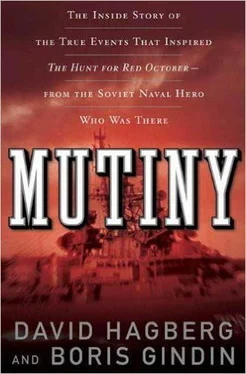In the first place, the remainder of the crew come to live aboard, which means that in addition to testing, aligning, and adjusting the myriad of systems, the officers—including Gindin—must teach their sailors everything, which includes showing them where and what the equipment is, how it works, and what they need to do to service it. He has to prepare the written instructions for all of those tasks as well, explain where each man’s post is, what his responsibilities are, and what his duties are under every circumstance imaginable.
In addition to getting the ship ready for sea, getting settled in, getting to know one another, the officers must teach their three-hour political indoctrination classes every second Monday, come rain or shine, come commissioning or war.
Four months later they sail the fifty kilometers west-southwest to their base at Baltiysk, where Potulniy assembles his crew on the dock for a brief ceremony with the commander of the Division of Big Antisubmarine Ships, Bolshykh protivolodochnykhn korablejj, Bpk Captain Second Rank Gennadi Zhuravlev. They’re all wearing their holiday uniforms because the Storozhevoy is being formally accepted into the division and readied for the shakedown process that will finally get him prepared for his first rotation. The testing and training become intense. The sooner the ship is certified, the sooner he can put out to sea to help defend the Motherland.
The Storozhevoy spends much of his time tied up at the dock while his systems and his crew are shaken out, but he also puts out to sea in the Baltic, sometimes for just a few hours, sometimes for a few days, no matter the weather. Every single system, down to the last nut and bolt, the last soldered connection, the last paper chart and pair of binoculars, the last set of parallel rulers, must be aboard and must be just right.
Then, finally, the blessed day the crew has been working for arrives. The Storozhevoy is given his final sign-off. His sailing orders. He is ready to put out to sea on his first six-month rotation.
The Storozhevoy is a warship.
When Gindin looks back on his twelve years of service in the Soviet navy it is with a certain amount of nostalgia and pride, even though his career ended badly and even though at its best his career was hard. There was almost continuous training, dealing with recalcitrant sailors, working long hours, no social life, putting up with the political indoctrination. Not very glamorous. In fact, at times Gindin had to wonder what was so good about the life of a Soviet navy officer.
“I always liked mechanics,” Gindin says. “It runs in my blood. I was never afraid to roll up my shirtsleeves and do the dirty jobs. I could work for hours and never notice where the time went. I enjoyed working with my hands. It wasn’t often you’d see people who were happy with their lives. But I was.”
Gindin has a growing love affair with the Storozhevoy from the moment he first lays eyes on him at the shipyard. Each time Gindin steps off the ship and walks away, he has to stop on the dock so that he can turn around and look at the Storozhevoy. Gindin knows everything there is to know about the ship, which makes him love him all the more.
To a true sailor a ship is more than just a collection of nuts and bolts, engines and pumps, wires and gauges, hatches and portholes, ladders and companionways. He is a living, breathing being that, very much like a high-class society woman, needs constant attention. That is perhaps why in most navies a ship is referred to as a she.
The Storozhevoy is in the Atlantic on the way home from his first rotation. In addition to the two marching gas turbines and the two boost engines, there are five much smaller diesel engines aboard that provide electrical power. After nearly six months at sea one of the diesels has broken down, and Gindin has used all the spare parts he’s managed to hoard. The diesel will not run properly, so he shuts it down so that it won’t damage itself beyond repair. If that happens the engine will have to be scrapped and Gindin will have a lot of explaining to do.
He gives his crew strict orders that under no circumstances will they start diesel number three. But there are two problems. The first is that according to regulations these engines have a five-thousand-hour life span before they should be rebuilt or replaced. That’s about one six-month rotation, plus a little safety margin. As with all things Moscow dictates, if a piece of machinery doesn’t live up to its expectations, the factory where it is built will not be found at fault, but the men who’ve been given the thing will be held accountable. The fact that this engine quit before its scheduled time is Gindin’s fault.
His solution is simple. His men will continue to log the engine’s hours in the book as if it were running. That way when they get back to base at Baltiysk diesel number three will have performed up to expectations and can be rebuilt or replaced. This is another system in the Soviet navy that works, despite regulations.
The second problem is Gindin’s sailors. These are the same young boys who steal potatoes so they can have midnight snacks because they’re hungry. The same guys who carry heavy wrenches back and forth so that they can get out of work. The very same kids who won’t get out of bed in the morning because they claim their fathers are alcoholics. They’re country bumpkins, muzhiks, and prostofiljas, but they are as curious and inventive when the need arises as they are usually bored. Just about every minute of every hour of every day and night of their lives is scheduled for them. They have to do something or they’ll go crazy. It’s called ispytyvat’ sud’bu, or, testing fate, pushing the envelope, just to see what happens.
It’s early afternoon of a lovely day. Gindin has gone up to his cabin to get a technical book when Igor Sheskin, one of his sailors, comes rushing up the companionway, all out of breath and red faced, screaming something about diesel number three.
Gindin jumps off his chair. “What are you talking about?” he demands.
“We can’t stop it!” Sheskin shouts. “It’s gone crazy!” He’s a blond kid with broad shoulders, one of Gindin’s best men. Sheskin is one of those born mechanics, a guy who knows how to use his hands.
There’s no time to ask questions. Gindin slams past the sailor and races headlong down the passageway and the stairs to the motor room. When he gets there, diesel number three is working like it’s been invaded by an evil spirit. It’s shaking nearly off its motor mounts, making crazy noises, belching smoke, and the RPMs are steadily increasing. The engine means to tear itself to pieces, and when it blows it will be like a bomb sending a spray of hot oil and jagged metal pieces in all directions. The motor room will be destroyed, and every wide-eyed sailor in the compartment will be cut to shreds. But none of these boys, not even Sheskin, know what to do.
Gindin has no time to think about the consequences. He rushes up to the engine and hits the EMERGENCY STOP button, with absolutely no effect. Diesel number three has a malevolent mind of its own.
He tries closing down the fuel distribution line, but that has no effect, either. Apparently the engine is siphoning fuel from one of the other distribution lines.
Finally Gindin yanks the handle that controls the air intake line, and almost immediately diesel number three begins to sputter and die, its RPMs slowly coming down and stopping.
The relative silence in the compartment is nearly deafening. Gindin is sure that his sailors can hear his heart slamming against his rib cage as he tries to catch his breath. He wants to tear into these guys. He’d given very specific orders that diesel number three was not to be started for any reason. For just this reason. If the engine had blown apart there would have been a lot of casualties down here, and all of them would have been on his shoulders.
Читать дальше












